英语否定句解析
关于英语中的否定句
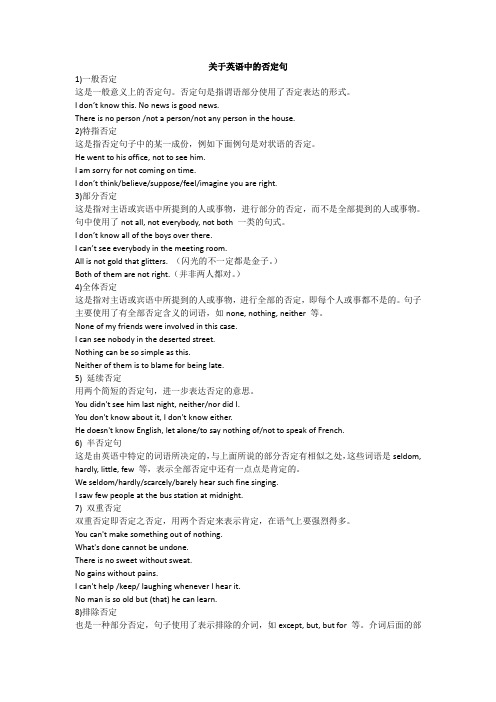
关于英语中的否定句1)一般否定这是一般意义上的否定句。
否定句是指谓语部分使用了否定表达的形式。
I don’t know this. No news is good news.There is no person /not a person/not any person in the house.2)特指否定这是指否定句子中的某一成份,例如下面例句是对状语的否定。
He went to his office, not to see him.I am sorry for not coming on time.I don’t think/believe/suppose/feel/imagine you are right.3)部分否定这是指对主语或宾语中所提到的人或事物,进行部分的否定,而不是全部提到的人或事物。
句中使用了not all, not everybody, not both 一类的句式。
I don’t know all of the boys over there.I can’t see everybody in the meeting room.All is not gold that glitters. (闪光的不一定都是金子。
)Both of them are not right.(并非两人都对。
)4)全体否定这是指对主语或宾语中所提到的人或事物,进行全部的否定,即每个人或事都不是的。
句子主要使用了有全部否定含义的词语,如none, nothing, neither 等。
None of my friends were involved in this case.I can see nobody in the deserted street.Nothing can be so simple as this.Neither of them is to blame for being late.5) 延续否定用两个简短的否定句,进一步表达否定的意思。
英语否定句疑问句

英语否定句和疑问句
英语否定句和疑问句的构成如下:
1.否定句:在英语中,否定句通常使用否定词,如“not”、“no”、“never”等,来表达否定的
意思。
例如,“I am not a student.”(我不是学生。
)“He does not like music.”(他不喜欢音乐。
)“We have never been to Paris.”(我们从没去过巴黎。
)
2.疑问句:疑问句是用来提出问题的句子。
在英语中,疑问句通常通过语序的调整来表示
疑问的语气。
例如,“Where are you from?”(你来自哪里?)“What time is it?”(现在几点了?)“How old are you?”(你多大了?)
请注意,一些特殊的疑问句形式可能需要进行特定的语序调整或使用特殊的疑问词。
例如,“How many books do you have?”(你有多少本书?)需要使用特殊疑问词“how many”来提问数量。
以上是英语否定句和疑问句的基本构成,但具体的用法和形式可能会因语法规则、语境等因素而有所不同。
学习笔记-英语否定句完全解析
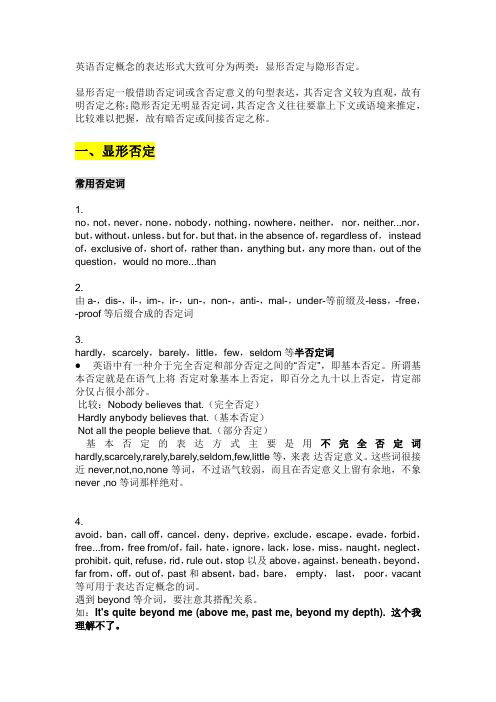
英语否定概念的表达形式大致可分为两类:显形否定与隐形否定。
显形否定一般借助否定词或含否定意义的句型表达,其否定含义较为直观,故有明否定之称;隐形否定无明显否定词,其否定含义往往要靠上下文或语境来推定,比较难以把握,故有暗否定或间接否定之称。
一、显形否定常用否定词1.no,not,never,none,nobody,nothing,nowhere,neither,nor,neither...nor,but,without,unless,but for,but that,in the absence of,regardless of,instead of,exclusive of,short of,rather than,anything but,any more than,out of the question,would no more...than2.由a-,dis-,il-,im-,ir-,un-,non-,anti-,mal-,under-等前缀及-less,-free,-proof等后缀合成的否定词3.hardly,scarcely,barely,little,few,seldom等半否定词英语中有一种介于完全否定和部分否定之间的“否定”,即基本否定。
所谓基本否定就是在语气上将否定对象基本上否定,即百分之九十以上否定,肯定部分仅占很小部分。
比较:Nobody believes that.(完全否定)Hardly anybody believes that.(基本否定)Not all the people believe that.(部分否定)基本否定的表达方式主要是用不完全否定词hardly,scarcely,rarely,barely,seldom,few,little等,来表达否定意义。
这些词很接近never,not,no,none等词,不过语气较弱,而且在否定意义上留有余地,不象never ,no等词那样绝对。
否定句的构成与否定词的用法解析
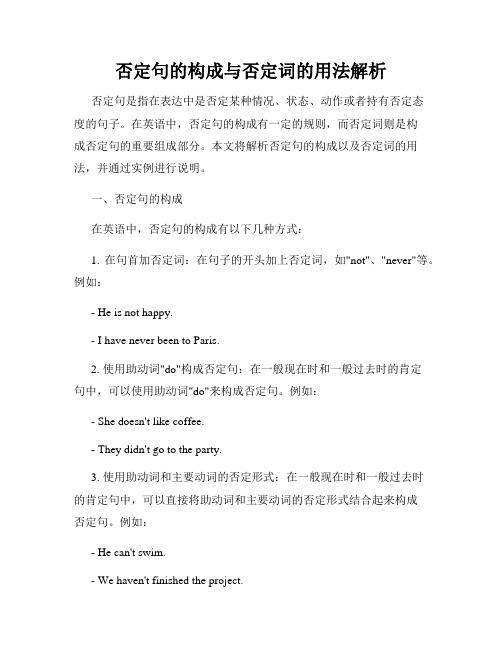
否定句的构成与否定词的用法解析否定句是指在表达中是否定某种情况、状态、动作或者持有否定态度的句子。
在英语中,否定句的构成有一定的规则,而否定词则是构成否定句的重要组成部分。
本文将解析否定句的构成以及否定词的用法,并通过实例进行说明。
一、否定句的构成在英语中,否定句的构成有以下几种方式:1. 在句首加否定词:在句子的开头加上否定词,如"not"、"never"等。
例如:- He is not happy.- I have never been to Paris.2. 使用助动词"do"构成否定句:在一般现在时和一般过去时的肯定句中,可以使用助动词"do"来构成否定句。
例如:- She doesn't like coffee.- They didn't go to the party.3. 使用助动词和主要动词的否定形式:在一般现在时和一般过去时的肯定句中,可以直接将助动词和主要动词的否定形式结合起来构成否定句。
例如:- He can't swim.- We haven't finished the project.4. 在部分否定句中使用否定词:在部分否定句中,使用否定词来否定句子中的某一部分。
例如:- She likes neither fish nor meat.- He rarely goes to the cinema.5. 使用连词构成否定句:使用连词"but"或者"yet"来构成否定句,表达与之前句子相反的情况。
例如:- I studied hard, but I didn't pass the exam.- She worked all night, yet she couldn't finish the report.二、否定词的用法解析否定词是构成否定句的重要组成部分,不同的否定词在否定句中起到不同的作用。
2021考研英语备考:长难句中的否定解析

2021考研英语备考:长难句中的否定解析一、一般否定句I don’t know this. No news is good news. There is no person /not a person/not any person in the house。
二、特指否定He went to his office, not to see him. I am sorry for not coming on time.I don’t think/believe/suppose/feel/imagine you are right。
三、部分否定I don’t know all of them. I can’t see everybody/everything. All the answers are not right。
并非所有答案都对。
All is not gold that glitters. 闪光的不一定都是金子。
Both of them are not right。
并非两人都对。
四、全体否定None of my friends smoke. I can see nothing/nobody. Nothing can be so simple as this. Neither of them is right。
五、延续否定You didn’t see him, neither/nor did I. You don’t know, I don’t know either. He doesn’t know English, let alone/to say nothing of/not to speak of French。
六、半否定句We seldom/hardly/scarcely/barely hear such fine singing. I know little English. I saw few people。
英语中必须掌握的八种否定形式
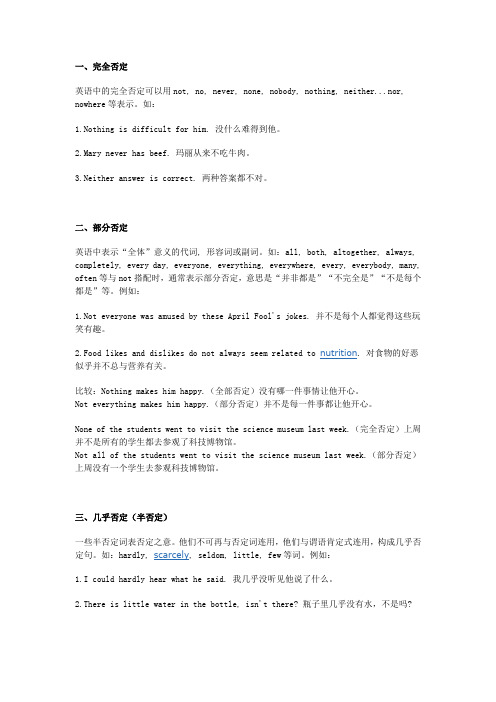
英语中的完全否定可以用not, no, never, none, nobody, nothing, neither...nor, nowhere等表示。
如:1.Nothing is difficult for him. 没什么难得到他。
2.Mary never has beef. 玛丽从来不吃牛肉。
3.Neither answer is correct. 两种答案都不对。
二、部分否定英语中表示“全体”意义的代词, 形容词或副词。
如:all, both, altogether, always, completely, every day, everyone, everything, everywhere, every, everybody, many, often等与not搭配时,通常表示部分否定,意思是“并非都是”“不完全是”“不是每个都是”等。
例如:1.Not everyone was amused by these April Fool's jokes. 并不是每个人都觉得这些玩笑有趣。
2.Food likes and dislikes do not always seem related to nutrition. 对食物的好恶似乎并不总与营养有关。
比较:Nothing makes him happy.(全部否定)没有哪一件事情让他开心。
Not everything makes him happy.(部分否定)并不是每一件事都让他开心。
None of the students went to visit the science museum last week.(完全否定)上周并不是所有的学生都去参观了科技博物馆。
Not all of the students went to visit the science museum last week.(部分否定)上周没有一个学生去参观科技博物馆。
否定句 英语 百科
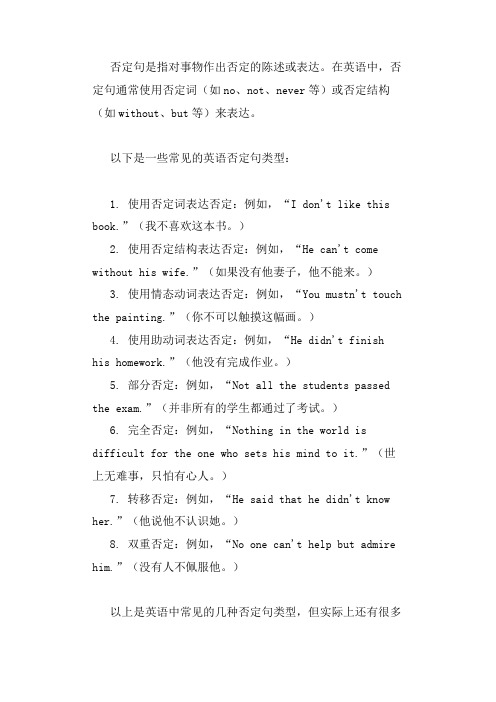
否定句是指对事物作出否定的陈述或表达。
在英语中,否定句通常使用否定词(如no、not、never等)或否定结构(如without、but等)来表达。
以下是一些常见的英语否定句类型:
1. 使用否定词表达否定:例如,“I don't like this book.”(我不喜欢这本书。
)
2. 使用否定结构表达否定:例如,“He can't come without his wife.”(如果没有他妻子,他不能来。
)
3. 使用情态动词表达否定:例如,“You mustn't touch the painting.”(你不可以触摸这幅画。
)
4. 使用助动词表达否定:例如,“He didn't finish his homework.”(他没有完成作业。
)
5. 部分否定:例如,“Not all the students passed the exam.”(并非所有的学生都通过了考试。
)
6. 完全否定:例如,“Nothing in the world is
diff icult for the one who sets his mind to it.”(世上无难事,只怕有心人。
)
7. 转移否定:例如,“He said that he didn't know her.”(他说他不认识她。
)
8. 双重否定:例如,“No one can't help but admire him.”(没有人不佩服他。
)
以上是英语中常见的几种否定句类型,但实际上还有很多
其他的表达方式。
在具体语境中,需要根据具体情况选择合适的表达方式。
英语否定句用法
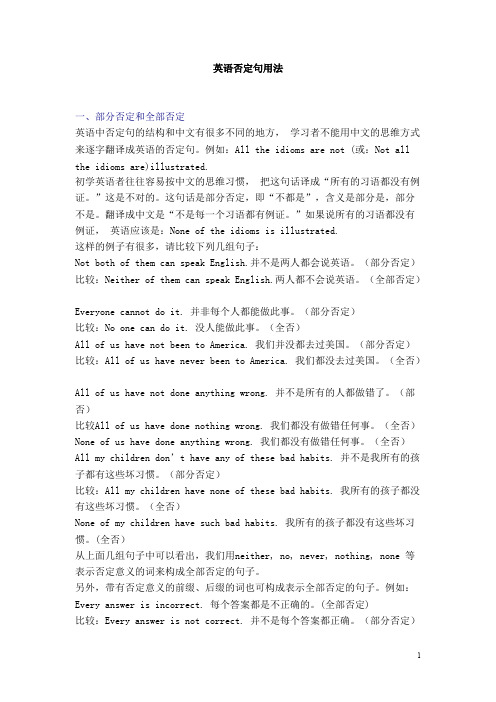
英语否定句用法一、部分否定和全部否定英语中否定句的结构和中文有很多不同的地方,学习者不能用中文的思维方式来逐字翻译成英语的否定句。
例如:All the idioms are not (或:Not all the idioms are)illustrated.初学英语者往往容易按中文的思维习惯,把这句话译成“所有的习语都没有例证。
”这是不对的。
这句话是部分否定,即“不都是”,含义是部分是,部分不是。
翻译成中文是“不是每一个习语都有例证。
”如果说所有的习语都没有例证,英语应该是:None of the idioms is illustrated.这样的例子有很多,请比较下列几组句子:Not both of them can speak English.并不是两人都会说英语。
(部分否定)比较:Neither of them can speak English.两人都不会说英语。
(全部否定)Everyone cannot do it. 并非每个人都能做此事。
(部分否定)比较:No one can do it. 没人能做此事。
(全否)All of us have not been to America. 我们并没都去过美国。
(部分否定)比较:All of us have never been to America. 我们都没去过美国。
(全否)All of us have not done anything wrong. 并不是所有的人都做错了。
(部否)比较All of us have done nothing wrong. 我们都没有做错任何事。
(全否)None of us have done anything wrong. 我们都没有做错任何事。
(全否)All my children don’t have any of these bad habits. 并不是我所有的孩子都有这些坏习惯。
(部分否定)比较:All my children have none of these bad habits. 我所有的孩子都没有这些坏习惯。
- 1、下载文档前请自行甄别文档内容的完整性,平台不提供额外的编辑、内容补充、找答案等附加服务。
- 2、"仅部分预览"的文档,不可在线预览部分如存在完整性等问题,可反馈申请退款(可完整预览的文档不适用该条件!)。
- 3、如文档侵犯您的权益,请联系客服反馈,我们会尽快为您处理(人工客服工作时间:9:00-18:30)。
1.全部否定(T otal negation)英语表示全部否定和汉语不尽相同,不是用all或every 加否定词,而是用none,nothing/nobody等。
1)Everybody talks about the weather, but nobody does anything about it.人人都在谈论天气,但面对天气却又束手无策(无能为力)。
2)I don’t know any of them. (=I know none of them.)他们当中没有一个我认识的。
3)All his plans came to nothing.他的所有计划都未能实现。
4)No man can serve two masters.一仆不能侍二主。
5)No man is content.人心不足。
2.部分否定(Partial negation)不定代词all, both, every, everybody, everything, 及副词everywhere, always, altogether, entirely, wholly 等+not,构成部分否定。
部分否定句很容易被误解为全部否定句,翻译时要倍加小心。
1)I don’t know all of you.你们大家我并不全认识。
2)All is not gold that glitters.闪闪发光物,未必尽黄金。
3)The good and beautiful do not always go together.善与美并不时常在一起。
4)I don’t wholly agree.我并不完全赞成。
5)All the answers are not right.答案并非全对。
3.延续否定(Continuative negation)延续否定是一种强调的否定,是在后半句中将前半句中的否定用短语或句子加以强调。
翻译是应该用适当的汉语词语表达出同等程度的强调,如使用“决不”、“更不用说”等。
1)He will not break his words, not he.4.半否定(Semi-negation/quasi-negation)常用的半否定词有hardly, little, scarcely, seldom, few, rarely等。
1)I need hardly say that he did quite well.他干得相当不错,这几乎不用我说。
2)Little remains to be said.简直没有什么可说的了。
3)I saw little or nothing of him after you were gone.5. 双重否定(double negation)双重否定是一种生动而强调的肯定,其形式变化颇多。
翻译是应尽可能保留否定的语气,比单纯的肯定有强而有力。
1)What’s done cannot be undone.事情已经做了,后悔也没有用;覆水难收;一言既出,驷马难追2)Y ou c an’t make something out of nothing.巧妇难为无米之炊。
3)We can live without food or water for some days, but without air we cannot live evena few minutes.没有食物和水,我们能够活上几天,但如果没有空气,我们甚至连几分钟也不能生存。
4)No sweet without sweat.没苦就没甜。
5)No gains without pains.不劳而无获。
6)Nothing venture, nothing have.不入虎穴焉得虎子。
6.转移否定(T ransferred negation)在转移否定句中,否定词虽然在谓语动词前,但否定的却是谓语以外的成分。
1) I didn’t go to see him off, but to meet him.我是去送他,不是去接他。
2) Y ou cannot judge a thing only by its looks.你不能光凭外表来判断一件事情。
3) He didn’t drive to work today.他今天不是开车来上班的。
4)This great victory has not been won easily.这个伟大胜利是得来不易的。
5)He didn’t give up because it was difficult.他不是因为困难而放弃的。
7.排除否定(Excluded negation)排除否定句一般用介词but,except,apart from等引出不包括的成分。
1)Genius is nothing but labour and diligence.天才就是勤奋。
2)Everybody is ready except him.除了他以外,大家都准备好了。
3)We all went but him.除了他以外,我们都去了。
4)During that time, we never experienced anything other than the utmost courtesy andgenuine friendship of the Chinese people.在那以前,我们从未经历过像中国人民所给予我们的那种最高礼遇和真诚友谊。
5)All items were discussed exclusive of the last two.除最后两项以外,其它都讨论到了。
6)They passed with the exception of three.他们当中除了三人其他都及格了。
7)I care for nothing besides(apart form) this.(除外)除了这个以外,我不要别的了。
试比较:Apart from(besides) English, he is well versed in Russian.(包括)除了英语,他还精通俄语。
8.比较否定(Comparative negation)包含比较的否定句有同级、比较级和最高级三级。
典型的句型有no more… than, no less…than, not so much…as, nothing is more… than…, nothing is so … as, …not better等。
这类句子理解起来有一定难度,所以翻译时需慎之又慎。
1) There is no more dangerous experiment than that of trying to appear what one is not.在人前装模作样,是比什么还要危险的尝试了。
2)A man has no more right to say an uncivil thing than to act one.一个人无权说无理的事,就像他无权做无理的事一样。
3)Doris gave no sign of good looks, her nose was too long and her figure was lumpy; so that Mrs Garstin could hope no more for her than that she should marry a young man who was well off and in a suitable profession.陶丽丝不能算美,她的鼻子太高,身子矮胖;所以嘉斯丁夫人除了指望她嫁给一个富裕而有适当职业的青年以外,别无奢望了。
4)The singer is no less a personage than a prince.那位歌手的名望正如一个王子。
9. “cannot/can never/could not/could never … too”及其它类似句型这一类句子也容易造成误解,翻译时要特别注意。
1)I can never thank him enough.我怎么感谢他都不够。
2)One cannot be too careful.一个人再怎么细心都不为过。
3)Y ou can never praise him too highly.你再怎么表扬他都不算过高。
4)The importance of reading cannot be over-emphasized.阅读的重要性再怎么强调都不为过分。
I.Warming up1.His hint escaped me2.The project is yet in the air3.She was over 70.nut she carried her years lightly.4.A bad book can go on poisoning people’s mind for any length of time.5.They never work without helping each other.6.His explanation is pretty thin.7.His speech leaves nothing to be desired.8.He knew he was mortally ill.9.His refusal was not final.II.Positive sentences turned into negative ones.1. Wet paint.!2. I hate to see that stony face of hers.3. He knew he was mortally ill.4. We’ll go for a picnic if the weather holds a couple of days.5. I missed seeing you in my class last week.6. I missed the school bus and had to take a taxi to school.7. He missed the basket.8. At that time girls were denied chances to go to school.9. Access denied!10. Access to the library is denied to self-taught students.11. Their efforts proved predictably futile.12. The teacher expects his students to attend his classes regularly.13. We may safely say so.14. Keep the medicine beyond children’s reach.15. The brave man, living or dead, who struggled here, have consecrated it (this ground) far above our poor power to add or detract.16. He was absent from class yesterday.17. Daring her husband’s absence, she had a hard time looking after her 4 kinds.18. Keep out19. It would be most disastrous if even a rumor of it were given out.20. This problem is above me.21. It is beyond my power to grant you such a long leave.22. I’m going to stay at school instead of going home during the vocation.23. Give me liberty, or give me death.24. The Indians were slow to perceive that their way of life was incompatible with thatof the English.25. Before the Indians realized what was happening, they were outnumbered.26. He is the last person I would like to see at the moment.27. He sat in his pants in his room.III. Negative sentences turned into positive ones1. No smoking!!No photo!2. Don’t make you conclusion until the end of the year.3. He returned home with no hope on his face.4. The students trust their teacher because he never fails to answer their questions.5. The workers are losing no time in constructing the new railroad.6. Law is no respecter of persons.8. The child can walk without any help.9. She came into the room with no shoes on.10. It can’t be better.11. This sculpture can’t be improved.12. I’m not a good sailor.Not all verse is poetry; not all prose about the past is history, nor is all literary work literature. The discrimination is habitually applied to other subjects, and clearly it is the quality which is decisive, not the quantity, scope or subject-matter, still less the popularity, of the work.。
